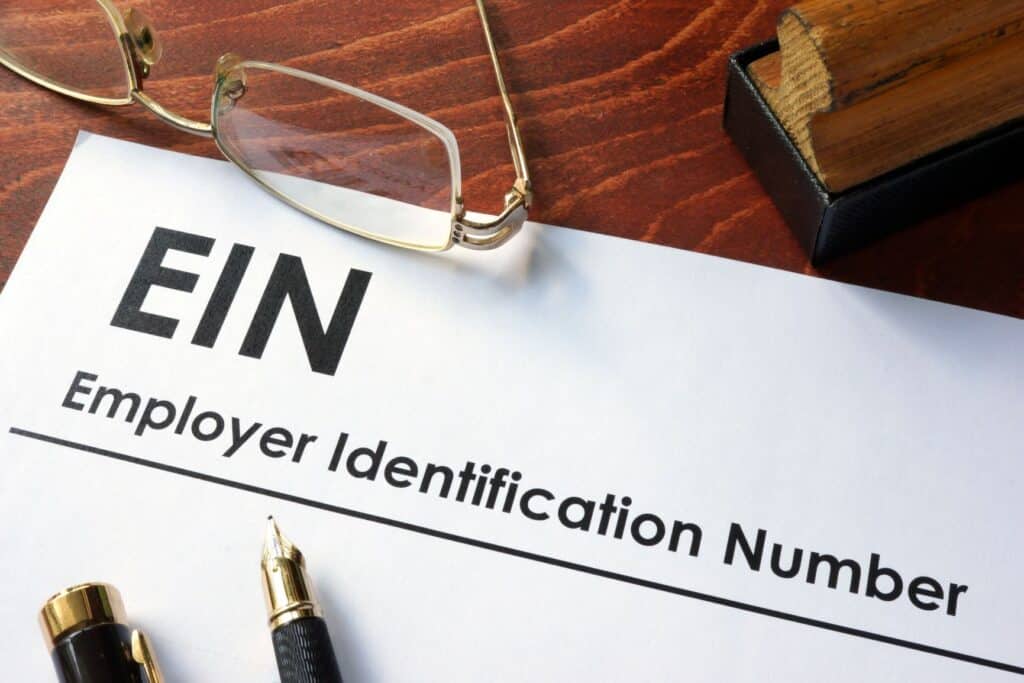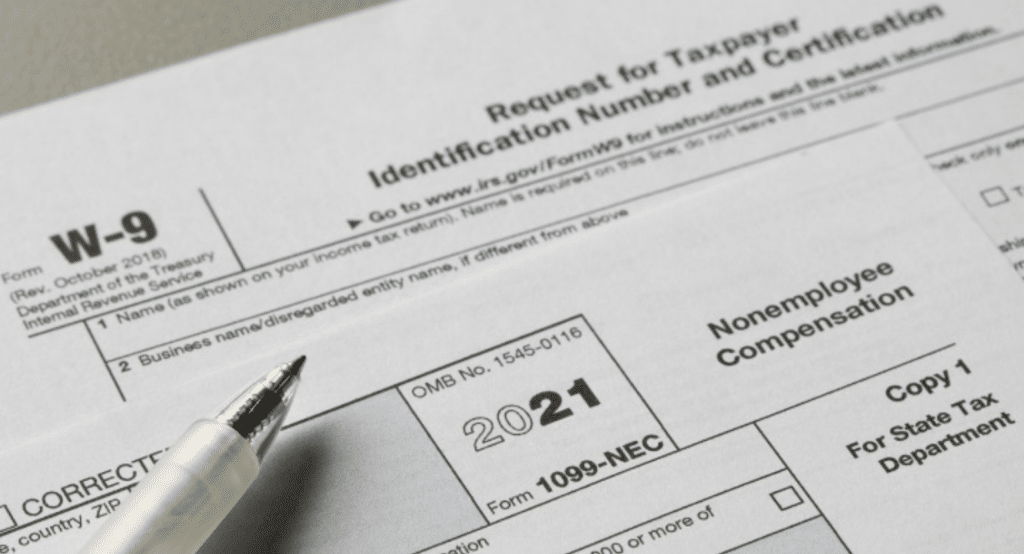EIN (Employer Identification Number) Definition
What is an employer identification number? An Employer Identification Number (EIN) is a unique nine-digit number issued by the Internal Revenue Service (IRS) in the United States. It’s also known as a Federal Tax Identification Number. The purpose of an EIN is to identify businesses, estates, trusts, and other entities for tax-related purposes.

EIN Number FAQs
What is an EIN Number?
What is an EIN? An EIN is similar to a Social Security number but is used specifically for business entities. It’s required for various activities such as filing tax returns, opening business bank accounts, applying for business licenses and permits, hiring employees, and conducting other financial transactions.
Obtaining an IRS Employer Identification Number is generally necessary for most types of businesses, including sole proprietorships, partnerships, corporations, limited liability companies (LLCs), and nonprofit organizations. It helps the IRS track and monitor the tax obligations and activities of businesses and other entities.
To apply for an EIN, business owners can complete an online application on the IRS website or submit a paper IRS EIN application (Form SS-4) by mail or fax. Once approved, the IRS will issue the EIN, which should be used for all tax-related correspondence and filings.
Why is an EIN Important?
A Federal Employer Identification Number is important for several reasons:
Tax Purposes
The primary purpose of an EIN is to identify businesses and other entities for tax-related matters. It’s used for filing tax returns, reporting income, and paying employment taxes. Without an EIN, a business may not be able to fulfill its tax obligations.
Legal Compliance
Many legal and regulatory requirements are tied to an EIN. For example, businesses need an EIN to open a business bank account, apply for business licenses and permits, and comply with federal and state tax laws. Having an EIN demonstrates that a business is properly registered and authorized to operate.
Hiring Employees
If a business plans to hire employees, it needs an EIN to fulfill various employment-related obligations. This includes reporting wages, withholding and paying payroll taxes, and providing tax forms such as W-2s to employees.
Business Transactions
An EIN is often required when engaging in certain business transactions. For example, when applying for business loans or credit, vendors and suppliers may request the EIN to verify the business’s legitimacy and creditworthiness.
Identity Protection
Using an EIN instead of a Social Security number can help protect business owners’ personal information. By separating personal and business finances, an EIN can reduce the risk of identity theft and fraud.
Business Identity
An EIN provides a unique identifier for a business entity. It helps establish the business’s separate identity, distinct from its owners or individuals associated with it. This is particularly relevant for entities like corporations and LLCs.
Overall, an employer’s identification number is important because it ensures compliance with tax and legal requirements, facilitates financial transactions, protects personal information, and establishes the identity of a business entity in the eyes of the IRS and other entities.
EIN vs TIN: What’s the Difference?
Tax Identification Numbers (TINs) and Employer Identification Numbers are both identification numbers used for tax purposes, but they have different scopes and applications. Here are the key differences between them:
Tax Identification Number
A Tax Identification Number is a general term that refers to various identification numbers used for tax purposes. It encompasses different types of identification numbers, including:
- Social Security Number (SSN): An SSN is a nine-digit number issued by the Social Security Administration (SSA) to individuals for tax and social security purposes. It’s primarily used for personal income tax filings and benefits administration.
- Individual Taxpayer Identification Number (ITIN): An ITIN is a nine-digit number issued by the IRS to individuals who are required to have a U.S. taxpayer identification number but are not eligible for an SSN. ITINs are typically issued to nonresident aliens, foreign nationals, and dependents or spouses of U.S. citizens or residents for tax filing purposes.
- Preparer Tax Identification Number (PTIN): A PTIN is a unique identification number assigned by the IRS to individuals who prepare tax returns for others as paid tax return preparers. It is used by tax professionals when signing tax returns they prepare.

(image source: https://finance.yahoo.com/news/taxpayer-identification-number-130035947.html)
Employer Identification Number
An Employer Identification Number is a specific type of Tax Identification Number used for businesses and other entities. The main differences between EINs and other TINs are:
- Scope: EINs are used exclusively for businesses, including sole proprietorships, partnerships, corporations, limited liability companies (LLCs), and nonprofit organizations. They identify the entity for tax purposes and facilitate compliance with employment and business tax obligations.
- Application: EINs are obtained through a separate application process specific to businesses, while other TINs like SSNs and ITINs have their own application processes for individuals.
- Business-Related Functions: EINs are used for various business-related functions such as filing tax returns, reporting income, paying employment taxes, hiring employees, opening business bank accounts, and complying with legal and regulatory requirements. Other TINs primarily relate to individual income tax filings, social security benefits, or tax return preparation.
How to Get an EIN Number
If you want to know How to Get an Employer Identification Number in the United States, you can follow these steps:
Determine Your Eligibility: EINs are generally required for most types of businesses, including sole proprietorships (if they’ve hired any employees), partnerships, corporations, limited liability companies (LLCs), and nonprofit organizations. Ensure that your business or entity qualifies for an EIN. According to the IRS:
- “You may apply for an EIN online if your principal business is located in the United States or U.S. Territories.
- The person applying online must have a valid Taxpayer Identification Number (SSN, ITIN, EIN).
- You are limited to one EIN per responsible party per day. The ‘responsible party’ is the person who ultimately owns or controls the entity or who exercises ultimate effective control over the entity. Unless the applicant is a government entity, the responsible party must be an individual (i.e., a natural person), not an entity.”
Gather Required Information: Before you apply for an EIN, gather the necessary information. This typically includes the legal name of the business, mailing address, type of entity, responsible party’s details (e.g., name, Social Security Number or Individual Taxpayer Identification Number), and the reason for applying (e.g., starting a new business, hiring employees, opening a bank account).
Choose an EIN Application Method: You can apply for Employer Identification Numbers through one of the following methods:
- EIN Online Application: The quickest and most convenient method is to apply online through the IRS website. Use the “EIN Assistant” tool and follow the prompts to complete the EIN application online.
- EIN Paper Application: Alternatively, you can complete a paper application (Form SS-4). Download the form from the IRS website or contact the IRS to request a physical copy.
Complete the Application: Whether applying online or using a paper application, provide accurate and complete information. Double-check the details before submission to avoid any errors or delays in processing.
Submit the Application: Depending on the chosen method, submit your application for Employer Identification Number as follows:
- Online: If applying online, submit the application electronically through the IRS website. You’ll receive your EIN immediately upon successful completion.
- Paper: If using a paper application, mail or fax the completed form to the appropriate IRS address or fax number specified in the form’s instructions. Note that processing times may be longer for paper applications.
Receive Your EIN: Once your application is processed and approved by the IRS, you’ll receive your EIN. The EIN confirmation will be sent to you by mail or email, depending on the application method used.
Keep Your EIN Secure: Safeguard your EIN as it’s a sensitive identifier for your business. Use it for tax-related purposes, employment matters, and other business transactions where it is required. If you do misplace your EIN and you’re searching for how to find my EIN, there’s no IRS EIN lookup database online; however, the IRS does provide a list of actions for how to find an Employer Identification Number.
Remember to consult the official IRS resources and guidelines for the most up-to-date information and instructions on obtaining an EIN.
Does Collective Offer EIN Support?
Getting an EIN is easier than you think. But if the process sounds complicated or too time consuming, Collective can help streamline the process for you. Sign up for a Collective account and let us take care of everything for you, from filing documents that will legally form your LLC, to submitting the right form to get your EIN right away.
